

QoreStor and Synology DSM are competing in the data storage space. QoreStor focuses on data optimization and cost reduction, while Synology DSM provides a comprehensive suite of management features. Synology DSM has the upper hand in offering a wide range of management features and seamless integration.
Features: QoreStor offers advanced data deduplication, compression, and replication, which significantly reduce storage costs. Its software flexibility allows it to run on various hardware, making it versatile for different environments. Synology DSM is favored for its extensive management features like surveillance, photo management, and streamlined backup processes. It supports software installations through a package center, enabling NAS devices to serve multiple roles, such as hosting web servers and a VPN server.
Room for Improvement: QoreStor could enhance its replication features and integration aspects with more third-party backup solutions. Additional improvements in user interface and setup instructions may help users better leverage its capabilities. Synology DSM could add more advanced data optimization features like deduplication and compression and improve initial hardware investment requirements. Simplifying the deployment process would make it more accessible to users with varying technical expertise.
Ease of Deployment and Customer Service: QoreStor is known for a straightforward virtual appliance setup with strong cloud integration support, complemented by personalized technical support. Synology DSM requires a more intricate installation due to hardware dependencies but benefits from extensive documentation and community resources. While Synology offers comprehensive guidance, QoreStor gives targeted support that caters to specific customer needs.
Pricing and ROI: QoreStor presents a cost-effective pricing model, yielding strong ROI through reduced storage expenses via effective data management. In contrast, Synology DSM necessitates a higher initial outlay due to hardware purchases but provides considerable value through its broad functionality and versatility. QoreStor emphasizes cost efficiency, whereas Synology justifies its pricing with comprehensive features and adaptability.


QoreStor optimizes storage costs through advanced deduplication and compression, seamlessly integrating with backup infrastructures and supporting diverse hardware. It enhances data security with replication and offers flexible deployment with minimal maintenance.
QoreStor offers significant benefits in deduplication, which leads to space savings and reduced storage expenses. This system integrates effortlessly with backup platforms like NetVault and Veeam, functioning as a reliable backup target for both on-premises and cloud environments. The ease of integration is complemented by its replication capabilities, which add a layer of data security by enabling geographically dispersed backups. Its cloud tiering functionality extends storage capabilities, ensuring cost-effectiveness compared to other solutions. While enhancements are needed in areas like Cloud Tier support, Air Gap features, and GUI intuitiveness, the continued developments aim to further optimize storage and backup solutions.
What are QoreStor's key features?QoreStor is widely implemented in industries for backup and restore operations, providing data deduplication and compression as key functionalities. Its integration as a backup target across platforms like NetVault and Veeam makes it ideal for enterprises that require efficient data management and storage cost control. Many organizations utilize its features to optimize cloud storage seamlessly while focusing on internal data handling or acting as service resellers.
We monitor all Backup and Recovery reviews to prevent fraudulent reviews and keep review quality high. We do not post reviews by company employees or direct competitors. We validate each review for authenticity via cross-reference with LinkedIn, and personal follow-up with the reviewer when necessary.